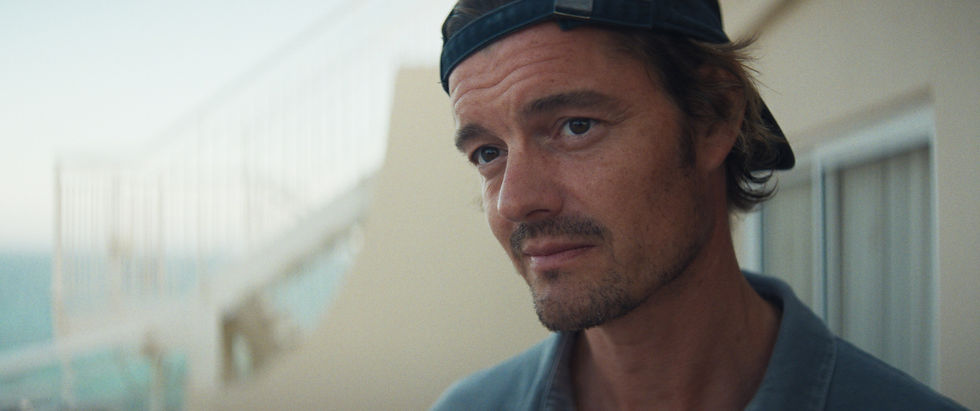SHIRLEY
- Kathleen Bondar

- Oct 31, 2020
- 3 min read
Updated: Aug 20, 2021
IN CINEMAS & ON CURZON HOME CINEMA 30 OCTOBER 2020
DIRECTOR: JOSEPHINE DECKER
CAST: ELISABETH MOSS; ODESSA YOUNG; LOGAN LERMAN; MICHAEL STUHLBARG
USA; 107 MINS;

REVIEW by KATHLEEN BONDAR
An endless tug of marital love and war in reaches fever pitch in Shirley reminiscent of Sylvia Plath and Ted Hughes's marriage which has fascinated psychoanalysts since the fifties. Film and theatre lovers might look to the marriage of Elizabeth Taylor and Richard Burton or when the couple played Martha and George in Edward Albee’s 1960 classic Who’s Afraid of Virginia Woolf?
Similarly, the film’s namesake Shirley, played to delicious, unnerving perfection by Elisabeth Moss of The Handmaid’s Tale fame, is an unhinged, literary genius to match Plath with the acerbic wit and jealous passion of Elisabeth Taylor’s Martha. Her husband Stanley (Michael Stuhlbarg), a celebrity college Professor, is a boozy, sharp witted George with egotistical, high intelligence surrounded by sashaying young females (surreally posing in a tree like tropical birds) for his salacious picking.
Shirley based on a novel by Susan Scarf Merrell, adapted for the screen by Sarah Gubbins, directed by Josephine Decker is about Shirley Jackson, the American, gothic-horror writer who came to fame in the mid-twentieth century. One critic called Shirley Jackson, “Virginia Werewolf”. Jackson married Stanley Edgar Hyman, a promiscuous Jewish intellectual at Syracuse University. So, Shirley is a convoluted result of a bunch of very clever creatives reworking Shirley Jackson's legacy.
In the film, continuing along the lines of the Albee classic, a young couple arrive on the scene, Fred (Logan Lerman), an ambitious, square-cut academic with his seemingly, apple-pie, eager-to-please wife, Rose (Odessa Young). Stanley offers free board and lodging in exchange for housekeeping. “I hope you don’t think I mean you to be a scullery maid” says the professor, meaning exactly that. And so, the audience is led into a labyrinth of possibilities as the four personalities interact.
Shirley creates suspense with a variety of tactics. Shirley is brimming with minor threats. She teases Rose with poisonous mushrooms and taunts her about Fred’s fidelity. Her perpetual inebriety threatens to unleash a nasty streak.
Shirley is a surreal, erotic, psychological thriller, constructed as if experiencing Shirley’s deranged intoxication, shot in a fifties light, using a combination of technicolour, sepia and a perpetual haze of smoke surrounding Shirley as she chain-smokes, clasping a whisky tumbler.
Relationships are precariously balanced. Shirley and Stanley belittle each other viciously; Stanley turns on Fred; Shirley tests and then tires of Rose but not before an illicit collaboration between the two women which drives most of the plot.
Female sexuality is dangerous: men are unfaithful; Fred is salacious; young women are tempting; Rose and Shirely conspire; Rose and Shirley might be lovers.
Female fertility is also alarming. Somehow Shirley knows Rose is pregnant. She is witch-like. “I’m a witch don’t you know?” She gibes Rose. “Happy healthy baby. That’s a spell we need. Unless you want the other spell?”
The older couple are pretty repulsive. Stanley ogles behind thick bifocals. He playacts like a Groucho Marx charicature. Shirley is in a perpetual state of disrepair and inebriety. Her tummy bulges and her breasts sag beneath lumpy cardigans and sloppy dresses. Like Stanley, her eyes bulge behind chunky frames.
And yet, curiously, Moss as Shirley is able to convey a Sapphic electricity with which to tempt Rose. They are bonded by the disappearance of a young woman who becomes the muse for Shirley’s impending novel. Shirley says, “I can’t figure out this girl”, Rose replies “maybe disappearing is the only way anyone would notice her.” This triggers a smile of recognition from Shirley as if realising a soulmate in Rose, or so we are led to believe.
Just as we think Shirley and Rose’s relationship is taking centre stage to disrupt the world, Professor Stanley interrupts, “it’s time for the children to leave.” Viewer, don't be lured into thinking marriage is a restorative. InShirley everyone leads a dystopian existence.
@CurzonCinemas
@ArtificialEye
@classicpenguins


